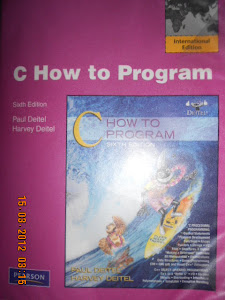A company pays its salespeople on a commission basis. The salespeople receive $200 per week plus 9% of their gross sales for that week.
Program below determines how many of the salespeople earned salaries in each of the following ranges.
- $200-299
- $300-399
- $400-499
- $500-599
- $600-699
- $700-799
- $800-899
- $900-999
- $1000 and over
[ Note: The salespeoples' gross sales is stored in gross[], there is no input needed. ]
/*
title: salesComission
coder: aeriqusyairi
date: Jan25 2012
*/
#include<stdio.h>
#define SALESPERSON 20
#define RANGE 9
void calculateSalary( int b[] );
void calculateRange( const int b[], int a[] );
int main(){
int gross[ SALESPERSON ] = { 3000, 4000, 7000, 8000, 10000, 30000, 500, 6000, 4000, 7000,
5000, 1500, 400, 15000, 2000, 50000, 3000, 40000, 5000, 10000 };
int salaryRange[ RANGE ] = { 0 };
int i, j, k;
calculateSalary( gross );
calculateRange( gross, salaryRange );
for(i = 0, j = 200, k = 299 ; i < RANGE; i++, j += 100, k += 100 ){
if(k < 1000)
printf("%d salesperson earn salary between %d and %d.\n", salaryRange[ i ], j, k );
else
printf("%d salesperson earn salary of %d and over.\n", salaryRange[ i ], j );
}
system("pause");
return 0;
}
void calculateSalary( int b[] ){
int i;
for(i = 0; i < SALESPERSON; i++){
b[ i ] *= 0.09;
b[ i ] += 200;
}
}
void calculateRange( const int b[], int a[] ){
int i;
for(i = 0; i < SALESPERSON; i++ ){
if( b[i] >= 200 && b[ i ] < 300 )
a[ 0 ]++;
else if( b[i] >= 300 && b[ i ] < 400 )
a[ 1 ]++;
else if( b[i] >= 400 && b[ i ] < 500 )
a[ 2 ]++;
else if( b[i] >= 500 && b[ i ] < 600 )
a[ 3 ]++;
else if( b[i] >= 600 && b[ i ] < 700 )
a[ 4 ]++;
else if( b[i] >= 700 && b[ i ] < 800 )
a[ 5 ]++;
else if( b[i] >= 800 && b[ i ] < 900 )
a[ 6 ]++;
else if( b[i] >= 900 && b[ i ] < 1000 )
a[ 7 ]++;
else if( b[i] >= 1000 )
a[ 8 ]++;
}
}


